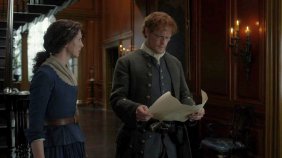S’il est une constante qui traverse l’œuvre de Diana Gabaldon, c’est bien l’état de guerre permanent, ou tout au moins, la présence d’une armée dominatrice.
Que ce soit au 20ème siècle, lorsque nous découvrons Claire, infirmière de guerre face à l’invasion nazi, ou au 18ème siècle lors de la domination britannique sur l’Écosse, puis dans les colonies de la Caroline du Nord, les soldats sont partout, comme une éternelle menace qui plane sur la population.
Mais il est une autre constante plus importante encore et qui, à mon sens, fait l’âme même de cette magnifique saga, c’est que ni Claire ni Jamie ne se battent pour assoir une domination quelconque. Ce n’est pas par idéologie qu’ils rejoignent le combat, pas même lorsqu’ils se rangent du côté des Jacobites. Leur dessin premier n’est pas de permettre à l’un ou l’autre des rois de s’installer sur le trône, mais d’empêcher un massacre de se produire et à un peuple de disparaître.
Et bien des années plus tard, lors de leur vie dans les colonies américaines, ils ne rejoindront pas l’armée d’un camp puis de l’autre pour se révolter ou même ne serait-ce que réclamer des terres qui leur reviennent ! Mais encore et toujours pour soutenir les opprimés et résister à l’injustice qui est faite à la population et à laquelle ils ne peuvent assister sans réagir.
Le tour de force de l’auteure est de nous conter une histoire où l’armée est omniprésente sans que jamais la haine, la fureur et la mort ne soit justifée et encore moins banalisée. En opposition à la guerre et à la haine, c’est l’amour et le respect de la vie qu’elle nous donne à lire, et cela éveille en nous des émotions fortes qui permettent de nous définir.
L'amour au coeur de la bataille
La guerre en toile de fond de la saga Outlander
Par Valérie Gay-Corajoud
Dans le tout premier épisode, puis, en rappel dans l’épisode 9 de la saison 2 : Je suis prest, nous comprenons très vite que si Claire s’engage dans l’armée britannique, ce n’est pas pour faire la guerre mais pour soigner, pour réparer et maintenir en vie. C’est ce pour quoi elle est se bat et se démène.
Ce sera sa destinée, où qu’elle soit et à n’importe quelle époque.
Nous ne ressentons aucune colère en elle, aucun désir de combattre si ce n'est la mort. Elle porte en elle une telle bienveillance, que chaque personne qu’elle croise devient importante.
Cela me fait beaucoup penser au film « Tu ne tueras point » de Mel Gibson qui raconte l’histoire véridique de Desmond Doss qui voulait participer à l’effort de guerre malgré des croyance religieuses qui lui interdisaient de tenir une arme. Il a pourtant sauvé des dizaines et des dizaines d’hommes en les soignant et en les arrachant aux feux nourris de l’armée ennemie.
Claire fait de même, elle affronte la guerre, mais ne s’en fait pas complice.
Les soldats qu’elle rencontre, le Caporal Grant et le première classe Lucas nous sont immédiatement attachants parce qu’elle nous les fait considérer comme des hommes et pas seulement comme des soldats. Dès cet instant, leur vie nous apparaît comme infiniment précieuse et il nous est aussi intolérable de les voir mourir l’un et l’autre, qu'il lui est intolérable de ne pas être en mesure de les sauver.
C’est d’autant plus terrible pour elle, qu’enfin revenue à la paix aux côtés de son époux, le destin la renvoie, certes, auprès de l’homme qu’elle va aimer éperdument, mais en temps de guerre, encore et toujours. D’ailleurs, les premières personnes qu’elle croise après avoir traversé les pierres, sont ces tuniques rouges, envahissantes, dominatrices, toutes puissantes.
Elle, l’ancienne infirmière de l’armée britannique, devient l’ennemie des forces qu’en d’autres temps elle soutenait. Et on mesure bien là l’absurdité de la guerre dès lors qu’on se positionne non comme un soldat mais comme un civil.
Et puis voilà qu’elle le rencontre cet homme pour qui son cœur ne cessera jamais de battre. Ce soldat comme elle l’appelle, mais qui, comme elle, ne l’est que par devoir et non par conviction. Immédiatement il se détache de ses compagnons par cette absence de hargne et de désir de domination. Il partage avec Claire le respect de la vie, et même s’il a déjà tué et tuera encore, jamais on ne le verra le faire avec colère ni désinvolture.


Et puis Jamie apprend aux côtés de Claire, car il a cette compassion en lui qui lui permet de faire le pendant avec sa nature guerrière et son passé militaire. Bien sûr, il se bat, se défend. Il tue, et tue encore, car c’est la guerre et que la vie de son clan en dépend. Il tue parce que sinon c'en sera fini de son pays. D’une certaine manière, c’est la mort qu’il tue.
La guerre fait rage puis passe, comme un fléau. Les hommes tombent par millier, pourquoi ?
Pour Jamie, plus rien n'a de sens si ce n'est peut-être, cette danse de la mort sur la lande de Culloden, avec son bourreau qui doit lui aussi disparaître. Sinon, à quoi bon tout ceci ?
Peut-être cette mort pourra recouvrir de son sens fondamental, l’absurdité de l’amoncellement des cadavres écossais qui jonchent le champ de bataille.
Et alors que Claire a retraversé les pierres, à l’abri d’une époque sans guerre où elle ne sera pourtant qu’à moitié en vie, Jamie subit les retombées de la défaite.
Tout d’abord comme fugitif dont l'existence n’a plus de sens, puis comme prisonnier, qui reprendra goût à la vie en s’occupant des autres. Car c’est cela que fait Jamie. Il battit et ne détruit pas.
Plutôt que d’éliminer ceux qui s’opposent à lui, il réunit ceux qui veulent construire quelque chose. C’est l’antithèse de la guerre. Et c’est ce que les armées dominatrices veulent combattre et détruire.
Les années passent, les épisodes s’écoulent et nous voilà dans les colonies britanniques de la Caroline du Nord. Le Pays est en train de s’ériger sur le massacre organisé des natifs. Les colons affluent de toute l’Europe. Anglais, Ecossais, allemands, français, la plupart pour fuir la guerre et l’oppression dans leurs propres pays.
Les colonisateurs façonnent le territoire comme il le souhaitent, chassant et massacrant les indiens, légiférant l'esclavage comme un droit inaliénable, manipulant les colons en leur cédant des terres sous conditions, les affaiblissant par des taxes infernales, gardant ainsi sous contrôle des éventuels soulèvements, éditant des lois de plus en plus drastiques pour justifier leur suprématie.
La guerre est là, sous-jacente, couvant au cœur même du nouveau monde… comme si l'homme portait en son sein les germes de sa destruction.
Alors Claire et Jamie à nouveau doivent prendre parti et c’est terrible car cela va à l’encontre de leur désir de vie !

Pour ceux qui n’ont pas lu l’intégralité des ouvrages de Diana, je m’arrête là, alors que bien évidemment, tout au long de son récit la guerre continue, s’amplifie, envahit et confisque les vies qu’elle désagrège sur son passage.
Mais ce que je retiens au bout du compte, ce ne sont pas tant les morts entassés, les vies sacrifiées, ni même l’effroyable propension de l’humain à éliminer ses semblables ! Non, ce que je retiens c’est que rien n’aurait de sens sans l’amour au premier plan.
Si l’amour perdure au sein de la guerre, alors, quel que soit le nombre de morts, la vie est sauve.
L’amour de Jamie et Claire, est le seul véritable rempart à la domination guerrière et c’est là que réside l’espoir.
Leur amitié avec les indiens en dit long sur leur capacité à respecter et se faire respecter, et nous rêvons pour eux que le reste du monde les oublie afin qu’ils vivent en paix dans une nature qu’ils aiment et qu’ils protègent. Mais ils ne peuvent aller à l'encontre de leur nature grégaire en se sentant responsables de toutes ces personnes qui vivent dans leur entourage. Alors à nouveau ils prennent les armes.
Haut de page
Autres textes qui pourraient vous plaire






